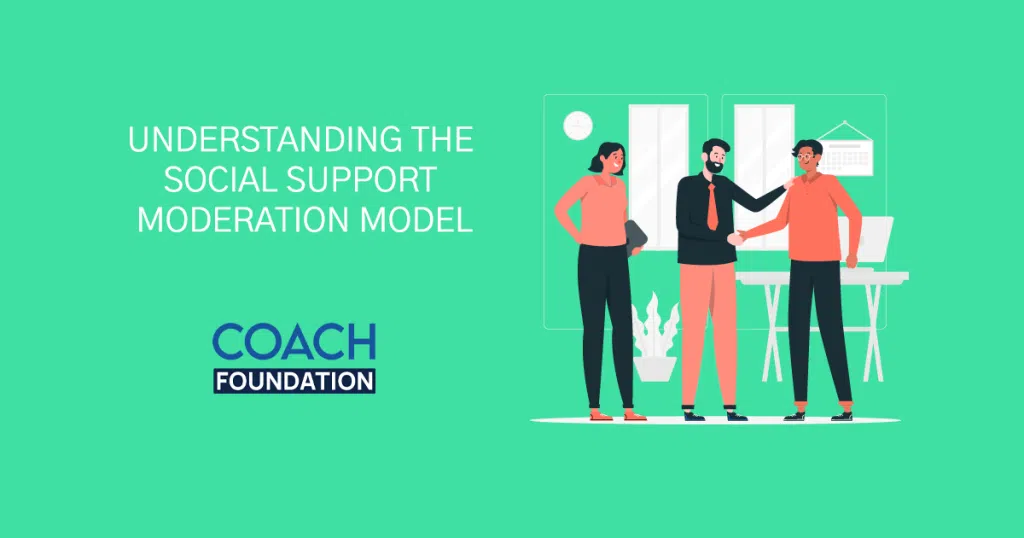Blog » Coaching Models and Techniques » The Social Support Moderation model
The Social Support Moderation model
Are you a coach looking to set up your dream business? If so, you may have come across the social support moderation model. This model is a valuable tool that can help coaches build a supportive community and provide their clients with the necessary resources to achieve their goals.

In this article, we will examine the foundations of the social support moderation model, including its development, methodology, strengths and weaknesses, and applicability to the work of coaches.
Fundamentals of Social Support Moderation model
The social support moderation model revolves around creating a nurturing environment where coaches can engage with clients, foster growth, and empower them to achieve their goals. It recognizes the importance of social support and leverages it to maximize the client’s progress. The fundamental benefits that it offers, includes the following;
1. Creates a Supportive Environment
The social support moderation model is rooted in the fundamental principle that people thrive in supportive environments.
This model recognizes that individuals have different levels of support needs, and it aims to create a safe and supportive community where members can connect, share, and support each other.
2. Encourages Community Communication
The model works by creating a framework that emphasizes social support and communication. Members are encouraged to provide constructive feedback, advice, and resources to help each other achieve their goals.
The model also recognizes the importance of moderators, who play a crucial role in ensuring that members adhere to community guidelines and that the quality of communication remains high.
3. Instills a Sense of Belonging
One of the key aspects of the social support moderation model is its ability to foster a sense of belonging.
By creating a community that values collaboration and mutual support, members are encouraged to feel like they are part of something bigger than themselves.
This sense of belonging is especially important for individuals who may feel isolated or disconnected from their social networks.
4. Promotes Collaborations
Another essential element of the social support moderation model is its focus on collaboration. Members are encouraged to work together to achieve their goals, and they are provided with tools and resources to facilitate this collaboration.
The model recognizes that individuals have different skill sets, and by working together, members can tap into each other’s strengths and expertise to achieve greater success.
Origin and History
The social support moderation model has its roots in social support theory, which suggests that people who have access to social support are more resilient, have better mental health outcomes, and are more likely to achieve their goals.
Cobb first proposed this theory in 1976, and since then, it has undergone extensive research and received support from numerous studies. You can read more about it here.
The social support moderation model builds on this theory by adding the concept of moderation. The process of ensuring that community members’ support is constructive and helpful to the recipient is known as moderation.
Moderation can take many forms, including peer review, expert guidance, and user feedback.
How does the Social Support Moderation model work
To simplify the social support moderation process and to ensure you understand how it works, we have listed six major steps that can get you started;
- The social support moderation model consists of three primary components: the community, moderators, and moderation tools.
- The community consists of members who share common goals, interests, or needs. Moderators are responsible for ensuring that the community remains supportive and constructive.
- Moderation tools are used to facilitate communication, feedback, and resource sharing.
- The model works by encouraging members to provide feedback and resources to each other in a supportive and constructive manner.
- Moderators play a crucial role in ensuring that this feedback is of high quality and that any negative or harmful feedback is removed.
- Moderators also provide expert guidance and resources to community members when needed.
Pros and Cons of Social Support Moderation Model
As is the case with any model, there are positives and negatives associated with the social support moderation model.
Pros
Some of the benefits of this model include:
1. Increased sense of belonging
The social support moderation model can help members feel like they are part of a community and that they belong. You can find more information on the relationship between a sense of community and general well-being here.
2. More comprehensive support
The model ensures that members receive the support they need, whether it’s expert guidance, peer review, or user feedback.
3. Improved mental health outcomes
Social support has been shown to have a positive impact on mental health outcomes. Not only are people able to make better and healthier choices and behaviors, but they’re also able to cope with stress and stay motivated as compared to people with weak social support. Read this article to find out more about this.
4. Improved goal achievement
The model provides resources and feedback that can help members achieve their goals more effectively. Constructive criticism and peer advice are excellent ways to improve the way an individual goes about achieving their goals.
Cons
However, there are also some drawbacks to this model. These include:
1. Time-consuming
Moderating a community can be a time-consuming task, and it may be challenging to find qualified moderators. Proper time-management skills are required to overcome this disadvantage.
2. Cost
Setting up and maintaining a community can be costly, especially if expert moderators are required. However, this can be managed by exploring alternatives.
3. Limited audience
The model may not be suitable for coaches with a small audience, as the benefits of a supportive community may be limited.
Conclusion
The social support moderation model serves as a powerful framework for coaches to establish their dream businesses. By incorporating active listening, customized support, and goal-setting, coaches can create a transformative coaching experience for their clients.
Through the implementation of this model, coaches foster a sense of belonging and empower clients to overcome challenges, unlock their potential, and achieve their goals.
Coaches can make a significant difference in people’s lives and facilitate their success in all areas if they adopt the tenets of the social support moderation model.
Frequently Asked Questions (FAQs)
1. Can coaches use the Social Support Moderation model?
Yes, absolutely. The social support moderation model is a valuable tool for coaches who want to create a supportive community for their clients.
It provides a framework for coaches to build a collaborative and supportive environment, which can help clients achieve their goals more effectively.
Coaches can use this model to create online communities, in-person support groups, or a combination of both.
They can leverage technology to build a virtual community of clients, or they can create in-person events where clients can meet and connect with each other.
However, coaches must be aware of the potential challenges associated with this model. For example, moderating a large online community can be time-consuming, and coaches must be prepared to devote the necessary resources to maintaining the community’s quality and engagement.
Moreover, coaches must ensure that their clients’ privacy and confidentiality are protected, especially in online communities.
Despite these challenges, the social support moderation model can be a powerful tool for coaches looking to create a supportive and collaborative environment for their clients.
By providing a sense of belonging and support, coaches can improve their clients’ overall well-being and increase their chances of achieving their goals.
2. What is the importance of the Social Support Moderation model?
The social support moderation model is important because it is a tool for coaches that can help them build a supportive community for their clients.
It allows coaches to create an environment that promotes collaboration and communication among members, which can help clients achieve their goals more effectively.
Research has shown that social support is essential for mental health and well-being. The social support moderation model provides a framework for coaches to create a supportive community that can provide clients with the necessary support, feedback, and resources they need to achieve their goals.
This model can help coaches provide a more comprehensive approach to coaching by addressing the psychological and emotional aspects of their clients’ lives.
Moreover, the social support model can help coaches build a loyal and engaged following of clients.
By providing a supportive and collaborative environment, coaches can create a sense of belonging among their clients, which can lead to increased client retention and referrals.
In conclusion, the social support moderation model is a valuable tool for coaches looking to set up their dream business.

ABOUT SAI BLACKBYRN
I’m Sai Blackbyrn, better known as “The Coach’s Mentor.” I help Coaches like you establish their business online. My system is simple: close more clients at higher fees. You can take advantage of technology, and use it as a catalyst to grow your coaching business in a matter of weeks; not months, not years. It’s easier than you think.
AS SEEN ON





